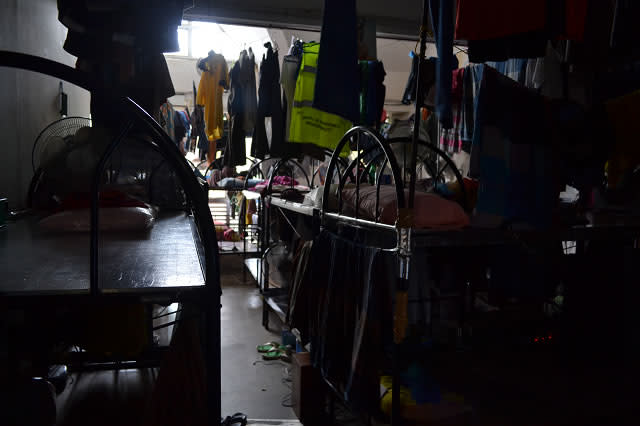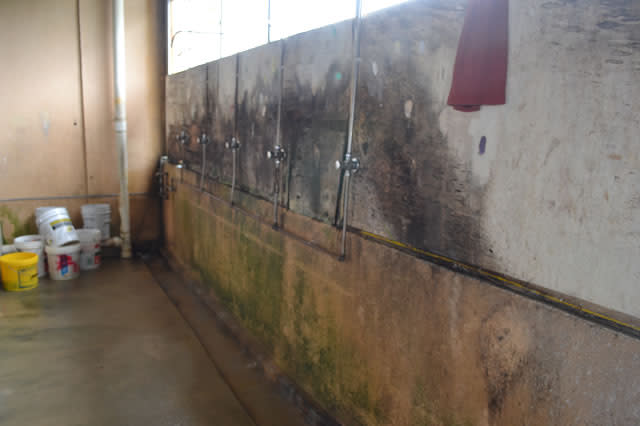Hidden slums of Singapore revealed
It was a bright afternoon. The innocent-looking, pastel-coloured façade of the row of buildings was deceiving.
The passageway was as dark as night. You could hardly see the steps on the stairs.
On the second floor lies the narrow doorway to the dormitory. Step inside and you are met with a room packed with 20 double-decker beds, stacked so tightly together there is hardly room to even walk or move around. The absence of storage space, such as cupboards or shelves, means possessions are strewn anywhere and everywhere.
Laundry is aired or dried inside the dormitory as well, given that there is also a lack of space outdoors for drying. Windows line one side of the wall but they hardly provide adequate ventilation. The room reeks of stale air.
There are 40 migrant workers in this one room.
This writer visited 4 dormitories in the same area and they all average 30 to 40 beds in each dormitory. This is not uncommon, nor surprising, to those who work with migrant workers. The SMRT drivers who recently went on strike and complained about having to share their rooms with 7 other workers, by comparison, had it good! Their complaints sparked a flurry of reaction from relevant authorities suddenly keen to look into the living conditions of migrant workers, despite many years of non-governmental organisations and activists raising these same concerns.
Admittedly, as far as the living conditions of foreign workers are concerned, there have been some improvement – there are now more purpose-built dormitories, more serious enforcement of the rules, and employers have been taken to task by the Ministry of Manpower (MOM) for failing to provide adequate housing for their workers.
Nonetheless, one wonders if these employers are only doing what any employer would do when faced with the rising costs of doing business.
In 2009, the MOM said that “acceptable accommodation is now readily available in purpose-built dormitories and there is no excuse for employers to house their workers in unapproved housing.”
But just earlier this month, concerns have been raised about the rising rents of dormitories, and how all 39 purpose-built dormitories are already fully occupied. The squeeze is exacerbated by the influx of more such migrant workers the last couple of years, putting a strain on infrastructure.
The government allows factory space in industrial estates to be converted to dormitories but they should meet certain requirements or benchmarks. Just take a walk around any of these industrial estates and visit these dormitories.
I did and here is what I saw.
The conditions are, quite honestly, appalling. It is even more unacceptable when one considers that employers are required to furnish the MOM with the addresses where their workers are put up, that the authorities claim to conduct regular inspections of these areas, and the fact that these dormitories have been around for quite some time. There is no reason for the authorities not to be aware of the existence and locations of these dormitories.
In total, there are easily a few hundred workers living in the dormitories in this particular industrial estate alone.
MOM statistics show that there are 722,800 work-permit holders here, excluding maids, as of June. With the purpose-built dormitories providing a reported 150,000 bed spaces, it means a sizable number of our migrant workers are housed in other facilities. Are they regulated, inspected regularly? If they are, it would be surprising then that the atrocious conditions in some of these dormitories have not been spotted, or the employers not taken to task.
One of the obvious concerns of these squalor-like dormitories is safety. Often, the main entrance is narrow, at times dark. The rear exits are just as narrow, some with obstruction or even had their gates locked. One shudders to think of the consequences if, say, a fire breaks out.
Mr Alan Lum, who heads MOM's Housing Enforcement Branch, is reported to have said in May this year: “We want to send them the message that they are entitled to a good living environment and that they should let us know when their living conditions are not meeting the standards.”
What MOM should realise, however, is the fear among the workers of speaking up and raising concerns which they have.
When this writer spoke to the workers in these dormitories, virtually all of them seemed resigned to their fate, even as they endure their inhumane living conditions. As one of the workers told me, “I tell [about this bad living condition], my boss will send me home. So, how to tell?”
According to Dr Noorashikin Abdul Rahman, the vice-president of migrant workers NGO, Transient Workers Count Too, “Employers may fire and repatriate the worker if they find out who complained. MOM should run a shelter for these workers to protect them from their employers.”
Unfortunately, MOM does not currently run such a shelter. It should if it is serious about improving the workers’ living conditions. It will go a long way in empowering these workers, and protect them from having to accept abuse and exploitation in silence.
Also, employers who fail to provide adequate housing for their workers may have the work permits of their workers cancelled. This is another reason why the workers will not speak up – once their work permits are cancelled, they will be sent home. But why should the workers be penalised – and this is a heavy punishment – for the recalcitrance of their employers?
Some members of the public opine that these workers actually are having it better than they do back in their own country, that although their living conditions here may be bad, they are actually better than what they face back home -- and thus they should not be complaining.
Human decency
It is appalling that we as Singaporeans should hold such views. Even if these workers did come from worse living environments back home, it doesn’t mean we treat them or provide for them just as badly.
In 2008, Member of Parliament for Tampines GRC, Irene Ng, asked the then-Minister for National Development, Mah Bow Tan: “Can I ask the Minister whether he agrees that as a decent society, it is our duty to provide the foreign workers in our midst decent and humane housing, so that they can come here and earn an honest wage and not feel like modern-day slave in Singapore?”
The minister agreed with the MP. “I think it is important for us to provide proper housing for all our workers,” Mah said, “not just from the point of view of humanity, as Ms Ng put it, but also because there are basic standards of fire safety and basic standards of health and sanitation that we need to take into account.”
No worker, who puts in an honest day’s work, should have to say – as one did to me – that he has no choice but to put up with such atrocious, slum-like living conditions.
Ms Ng is right. These workers have come to build what we need. It is thus our basic duty to treat them with humaneness and decency.
Related stories:
Are 'proper channels' adequate for foreign workers?
Look inside a foreign workers' dorm
Chinese foreign worker rescued from repatriation





